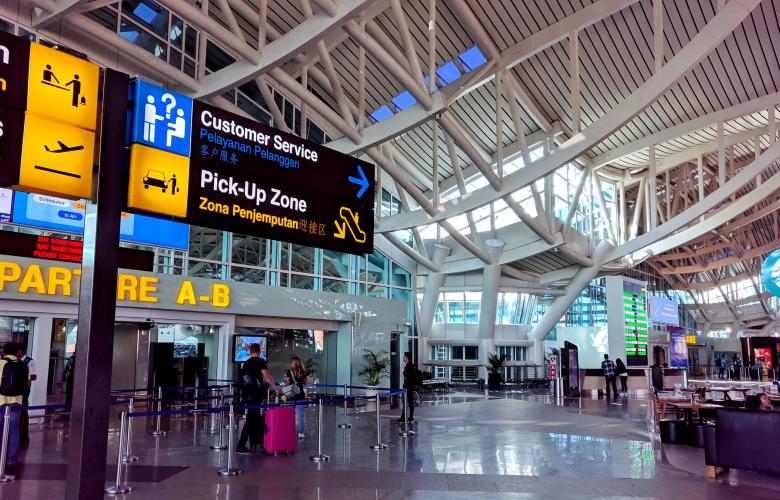Despite erupting volcanoes and investors hedging their bets on the results of Indonesia's recent elections, Bali's tourism industry kicks of 2019 beating last year's Q1 foreign arrival figures by almost 3 percent.
At first glance 3 percent may not seem like a lot, but that translates to an additional 13,000 foreign visitors a month - all needing accommodations, food, drinks, entertainment and some form of transport.
Chinese tourists on the rise
Haruman Sulaksono, General Manager of PT Angkasa Pura I (Persero) the state-owned airport services company managing Ngurah Rai International Airport, said China topped the list, followed by Australia and India according to Bali Tribun.
Chinese tourists account for around 32 percent of all foreign arrivals with the highest growth rates coming from South Korea at 18 percent followed by the United Kingdom at 14 percent and Japan at 11 percent.
Creating unforgettable experiences
Haramun went on to explain Angkasa Pura's was committed to improving arrival numbers by creating unforgettable experiences for guests including various forms of welcome at the airport "that pamper the senses of sight through Balinese ornaments and ornaments, the sense of smell through the fragrant flower arrangements, and the sense of hearing through Balinese music."
However, as Gapura Bali reported in January, the customer experience with a brand like Bali needs to be something everyone from airport management to taxi drivers believes in and engages with. It's all connected. "When passengers have just stepped off a 15-hour flight and walk straight into long immigration queues and are then hounded by persistent groups of taxi drivers for example, all aggressively offering 'the best price' and all bargaining down to an even 'better price,' it sets the wrong tone and for some it's simply the worst 'welcome experience' and a difficult one to forget. This is why it's so important for Bali to think about its brand and how this brand is delivered," the report claims.
Better global access
Recently opened new flight routes to Bali are most likely having a significant impact on this positive arrival trend. According to data released by Routes Online, there have been thirteen new routes and schedules introduced in the last 12-months, including:
- Garuda Indonesia launch Bali - China charter routes in January 2018
- Qantas adds Melbourne – Denpasar from late June 2018
- Emirates adds Denpasar – Auckland service from June 2018
- Singapore Airlines schedules 787-10 Denpasar service from July 2018
- Lion Air adds Denpasar – Tianjin service from mid-July 2018
- Garuda Indonesia increases Denpasar – Seoul service in August 2018
- Aeroflot resumes Denpasar service from late-Oct 2018
- Thai Lion Air adds Denpasar service from late-Dec 2018
- Garuda Indonesia launches direct fights to London from Bali in January 2019
- Malaysia Airlines announces an increases in Denpasar service in March 2019
- VietJet start Hanoi to Denpasar route in May 2019
- Malindo Air schedules Adelaide launch in mid-April 2019
- Turkish Airlines plans Denpasar launch in July 2019
Speaking to reporters on VietJet's recent announcement introducing flights from Hanoi to Denpasar, Haruman believes "there will be several airlines that will open new routes and increase flight frequencies. This is also expected to be a catalyst for increasing tourist visits to Bali," in 2019 and a "positive indicator" arrival figures will continue to increase.
How does an increase in foreign arrivals impact Bali's real estate industry?
Terje Nilsen from Harcourts Seven Stones believes growth in tourism translates to growth in real estate investments overall. "It also shows that properties out there are not struggling to find tenants, subject to them being properly operated, of course. It's also good to see there is overall growth in most markets." But he also shares a word of caution. "Hopefully further focus and concrete action on infrastructure will really take off this year to support tourism's growth. Traffic is becoming a real issue, for example, and unless it's addressed it will only get worse as arrival numbers increase," he told WILLIAMS MEDIA, "and if it gets worse the real estate industry will also suffer from the negative knock-on effects."
Are tourists real estate investors?
There's a different take on tourism growth and real estate from Dominique Gallmann of Exotiq Property Bali. "Rising tourist numbers are not necessarily a good thing," he says. "Particularly not if the infrastructure isn't ready to accommodate larger numbers and if the tourist dollar doesn’t get into Bali's economy. In the past, when the majority of tourists came from the United States and Europe, for example, the rising number of arrivals would definitely impact the real estate industry positively. These days, I don’t think this logic holds anymore, as the countries that generate the largest tourist flows are not typical real estate investors. This may change in the future, though."
Hospitality-oriented real estate
Eugene Shivnan from Harcourts Purba refers to a recent report published by C9 Hotelworks, which suggested that despite the upward movement of tourism numbers in Bali, the resort real estate market remains challenged. The report goes on to suggest, "along with the growth of tourism over the past decade, Bali’s hotel residence sector has risen as more developers are looking to sell hospitality-oriented real estate. Currently, in the market, 74% of the units for sale are in completed hotel projects and the remaining being off-plan or under construction."
Sources: Bali Tribun, Routes Online, Angkasa Pura, C9 Hotelworks, Gapura Bali
Similar to this:
Cutting red-tape essential for Indonesia to attract more foreign investment
Is Lombok ready for take off?
A growing trend in Bali's property space





